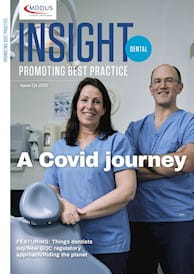
MANY of us are familiar with the CQC’s comprehensive practice inspections. In the past, around 10 per cent of dental practices were "routinely" inspected each year. The CQC now has a new approach in which there are no routine inspections. Instead, a transitional regulatory approach comprises a remote conversation in the first instance. The CQC is focusing on safety, how effectively a service is led and how easily people can access the service.
What to expect
Practices will be contacted by the CQC to arrange a discussion, which will take place via Microsoft Teams or telephone. This will take one to two hours and will be used by the CQC to decide whether or not to undertake an inspection or other regulatory action.
Before the discussion, the CQC will consider what information it has regarding the dental practice. This could include previous inspection reports, the CQC inspectors’ knowledge of the practice, and information from other sources, e.g. patients, staff, Healthwatch or the area team.
The CQC has published the questions which will form the basis of its discussion with dental practices. Members will find it helpful to review these questions so that they can be confident that the practice is in a position to demonstrate compliance.
There are questions relating to each key line of enquiry (KLOE), some of which are specific to the pandemic, including for example:
- What changes have you made to infection control arrangements to protect staff and patients using the service?
- How do you ensure staff have the appropriate time for donning/doffing PPE and cleaning between seeing patients?
- When was your last audit of IPC/ PPE/ the environment and facilities? What did it tell you and what actions have you taken?
- What actions are you taking to protect and support the health, safety and wellbeing of staff, particularly those who are high-risk/BAME?
The discussion
During the discussion, the CQC inspector may ask you to share information during the call, via "screen share” or email attachment. The CQC inspector will note details of:
- discussion around the questions
- specific risks identified
- examples of good practice and improvements to the service.
The discussion will not normally be recorded.
What happens next
If no further action is required, the CQC will send the practice a copy of the monitoring summary record. This is not an inspection report and will not appear on the CQC website.
If the CQC considers that there may be a risk to the safety of people using the practice, it will take further action. This could be help to find additional resources, a practice inspection, or enforcement action.
We know from the CQC's own data that over 5,000 of the around 11,000 dental services registered with the CQC have not yet been inspected. One might predict that they would be some of the first to undergo the new transitional monitoring conversations, along with those practices where the CQC has identified issues or received information from an external source. The CQC plans to make 1,500 transitional monitoring calls to dental practices in the period up to April 2020.
It is widely reported that the CQC is receiving more whistleblowing calls than ever before, and it is obliged to act on that information. It makes sense to ensure that all of the team are empowered to speak up and raise any concerns. The key is to ensure that everyone, staff and patients alike, feels that their views are being heard and, where appropriate, acted on.
What to do now
It pays to be prepared to demonstrate your compliance during a transitional monitoring conversation. Given that a remote conversation is quite different from a practice inspection, some practices are not only already checking their compliance but also planning how they would respond to anticipated questions from the CQC. This includes who to involve in the call. That might be the registered manager along with others in the team at various points during the conversation.
Reviewing the CQC questions and your planned answers as a team can result in a valuable exploration of different perspectives. This can also assist in ensuring that everyone in the team understands the practice procedures and protocols, and the practicalities. Any misunderstandings and anomalies can then be identified prior to the CQC’s call, so that the practice can be confident of demonstrating compliance.
In short
- No routine inspections.
- Be aware that the CQC continues to collect information from other sources.
- Prepare for transitional monitoring conversations. Review the questions beforehand and consider how you will demonstrate compliance in your answers.
Find out more
Access our new on-demand CQC webinar for dental practices available free to MDDUS members.
Links to useful MDDUS checklists (member log in required)
This page was correct at the time of publication. Any guidance is intended as general guidance for members only. If you are a member and need specific advice relating to your own circumstances, please contact one of our advisers.
Read more from this issue of Insight Dental

Save this article
Save this article to a list of favourite articles which members can access in their account.
Save to library